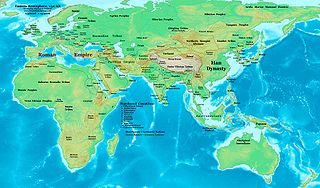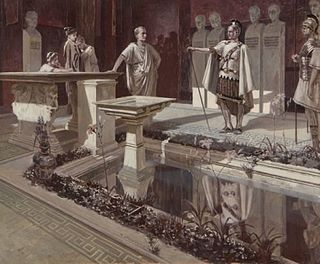Related Research Articles

The 50s decade ran from January 1, 50, to December 31, 59. It was the sixth decade in the Anno Domini/Common Era, if the nine-year period from 1 AD to 9 AD is considered as a "decade".
AD 39 (XXXIX) was a common year starting on Thursday of the Julian calendar. At the time, it was known as the Year of the Consulship of Augustus and Caesianus. The denomination AD 39 for this year has been used since the early medieval period, when the Anno Domini calendar era became the prevalent method in Europe for naming years.

Herod Agrippa, also known as Herod II or Agrippa I, was a King of Judea from AD 41 to 44. He was the last ruler with the royal title reigning over Judea and the father of Herod Agrippa II, the last king from the Herodian dynasty. The grandson of Herod the Great and son of Aristobulus IV and Berenice, he is the king named Herod in the Acts of the Apostles 12:1: "Herod (Agrippa)".

Gaius Suetonius Paulinus was a Roman general best known as the commander who defeated the rebellion of Boudica.

The gens Petronia was a plebeian family at ancient Rome. This gens claimed an ancient lineage, as a Petronius Sabinus is mentioned in the time of Lucius Tarquinius Superbus, the last of the Roman kings, but few Petronii are mentioned in the time of the Republic. They are frequently encountered under the Empire, holding numerous consulships, and eventually obtaining the Empire itself during the brief reign of Petronius Maximus in AD 455.

Aulus Plautius was a Roman politician and general of the mid-1st century. He began the Roman conquest of Britain in 43, and became the first governor of the new province, serving from 43 to 46.

Herod Antipas, was a 1st-century ruler of Galilee and Perea, who bore the title of tetrarch and is referred to as both "Herod the Tetrarch" and "King Herod" in the New Testament, although he never held the title of king. He is widely known today for accounts in the New Testament of his role in events that led to the executions of John the Baptist and Jesus of Nazareth.

The First Jewish–Roman War, sometimes called the Great Jewish Revolt, or The Jewish War, was the first of three major rebellions by the Jews against the Roman Empire, fought in Roman-controlled Judea, resulting in the destruction of Jewish towns, the displacement of its people and the appropriation of land for Roman military use, as well as the destruction of the Jewish Temple and polity.
Publius Petronius Turpilianus was a Roman senator who held a number of offices in the middle of the 1st century AD, most notably governor of Britain. He was an ordinary consul in the year 61 with Lucius Junius Caesennius Paetus as his colleague.

The Jewish–Roman wars were a series of large-scale revolts by the Jews of the Eastern Mediterranean against the Roman Empire between 66 and 135 CE. While the First Jewish–Roman War and the Bar Kokhba revolt were nationalist rebellions, striving to restore an independent Judean state, the Kitos War was more of an ethno-religious conflict, mostly fought outside Judea Province. Hence, some sources use the term Jewish-Roman Wars to refer only to the First Jewish–Roman War and the Bar Kokhba revolt (132–135 CE), while others include the Kitos War as one of the Jewish–Roman wars.

Lucius Vitellius was the youngest of four sons of procurator Publius Vitellius and the only one who did not die through politics. He was consul three times, which was unusual during the Roman empire for someone who was not a member of the Imperial family. The first time was in the year 34 as the colleague of Paullus Fabius Persicus; the second was in 43 as the colleague of the emperor Claudius; the third was in 47 again as the colleague of the emperor Claudius.

Judaea was a Roman province which incorporated the regions of Judea, Samaria and Idumea, and extended over parts of the former regions of the Hasmonean and Herodian kingdoms of Judea. It was named after Herod Archelaus's Tetrarchy of Judaea, but the Roman province encompassed a much larger territory. The name "Judaea" was derived from the Kingdom of Judah of the 6th century BCE.

The Herodian dynasty was a royal dynasty of Idumaean (Edomite) descent, ruling the Herodian Kingdom and later the Herodian Tetrarchy, as a vassal state of the Roman Empire. The Herodian dynasty began with Herod the Great, who assumed the throne of Judea, with Roman support, bringing down the century long Hasmonean Kingdom. His kingdom lasted until his death in 4 BCE, when it was divided between his sons as a Tetrarchy, which lasted for about 10 years. Most of those tetrarchies, including Judea proper, were incorporated into Judaea Province from 6 CE, though limited Herodian de facto kingship continued until Agrippa I's death in 44 CE and nominal title of kingship continued until 92 CE, when the last Herodian monarch, Agrippa II, died and Rome assumed full power over his de jure domain.

The Herodian Tetrarchy was formed following the death of Herod the Great in 4 BCE, when his kingdom was divided between his sons Herod Archelaus as ethnarch, Herod Antipas and Philip as tetrarchs in inheritance, while Herod's sister Salome I briefly ruled a toparchy of Jamnia. Upon the deposition of Herod Archelaus in 6 CE, his territories were transformed into a Roman province. With the death of Salome I in 10 CE, her domain was also incorporated into the province. However, other parts of the Herodian Tetrarchy continued to function under Herodians. Thus, Philip the Tetrarch ruled Batanea, with Trachonitis, as well as Auranitis until 34 CE, while Herod Antipas ruled Galilee and Perea until 39 CE. The last notable Herodian ruler with some level of independence was Agrippa I, who was even granted the Judea province, though with his death in 44 CE, the provincial status of Judea was restored for good.
Marullus was the 7th Roman Prefect of the Roman province of Judea 38-41 under Caligula, 37–41.
The gens Vitellia was a family of ancient Rome, which rose from obscurity in imperial times, and briefly held the Empire itself in AD 69. The first of this gens to obtain the consulship was Aulus Vitellius, uncle of the emperor Vitellius, in AD 32.

The Herodian Kingdom of Judea was a client state of the Roman Republic from 37 BCE, when Herod the Great was appointed "King of the Jews" by the Roman Senate. When Herod died in 4 BCE, the kingdom was divided among his sons into the Herodian Tetrarchy.
References
- ↑ Attilio Degrassi, I fasti consolari dell'Impero Romano dal 30 avanti Cristo al 613 dopo Cristo (Rome, 1952), p. 8
- ↑ Anthony A. Barrett, Caligula; The Corruption of Power (Guild Publishing 1989), p. 240
- ↑ Richard Gottheil, Samuel Krauss, "Petronius, Publius", Jewish Encyclopedia (1906)
- ↑ Barrett, Caligula, pp. 188-191
- ↑ CIL VI, 6866. Syme notes that she does not appear in either the Realencyclopädie der classischen Altertumswissenschaft or Prosopographia Imperii Romani
- ↑ Tacitus, Histories , ii.63
- ↑ Tacitus, Agricola ch. 16